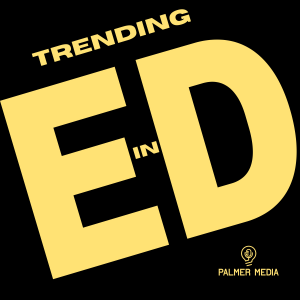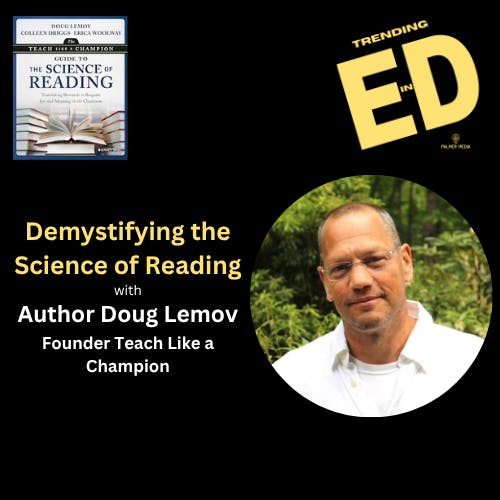

Trending In Ed with Mike Palmer
https://feeds.megaphone.fm/KAP3710732955Episode List

Math Mind: The Simple Path to Loving Math with Author Shalinee Sharma
Shalinee Sharma is the CoFounder and CEO of Zearn and the author of Math Mind: The Simple Path to Loving Math. She joins host Mike Palmer in a conversation about what it takes to instill a genuine love of math in all kids. We begin by hearing Shalinee's origins in consulting at Bain before she jumped into the opportunity to cofound Zearn and lead its growth to where it is today. She demonstrates ways to make math resonate with Mike as a sample pupil. Of course, there is talk of AI and how a love of math fits into the future of work and human life. And through it all, Shalinee grounds the conversation in the practical tips and surprising insights she's gleaned from students using an online math program to solve over one billion problems. Don't miss this chance to dive deep into the future of math instruction with a renowned expert in the field who imparts unique wisdom about how math instruction needs to evolve for students, teachers, and parents. Subscribe to Trending in Ed wherever you get your podcasts. Visit us at TrendinginEd.com for more sharp takes on the future of learning. 00:00 Introduction to Trending in Education 01:10 Meet Shalinee Sharma: From Bain to Zearn 02:52 The Mission of Zearn: Loving Math 06:35 Understanding Math Through Axiomatic Proofs 11:29 The Importance of Numeracy 18:48 Zearn's Approach to Math Education 22:08 Building Competence and Confidence 23:04 Engagement Strategies in Education 26:50 The Role of AI in Education 32:33 Conceptual Understanding in Math 36:11 Practical Tips for Parents and Teachers 42:09 Final Thoughts and Takeaways

Demystifying the Science of Reading with Doug Lemov, Founder of Teach Like a Champion
Mike Palmer welcomes Doug Lemov, founder of Teach Like a Champion, to the podcast. Lemov discusses his journey from teacher to education innovator and the evolution of Teach Like a Champion. He highlights the importance of the new book, The Teach Like a Champion Guide to the Science of Reading, co-authored with Colleen Driggs and Erica Woolway. The conversation delves into the critical role of attention in reading, the impact of technology on cognition, and the power of shared reading experiences in the classroom. Lemov also explains the significance of close reading and knowledge-based comprehension, advocating for bringing complex texts, whole books, and writing back into the classroom. Key Takeaways: The Science of Reading: The importance of understanding the research behind reading acquisition and applying it to teaching practices beyond early elementary grades. Attention in the Digital Age: How screens and social media fragment attention, and the need to rebuild students' capacity for sustained concentration through practices like reading physical books and extended reading periods. The Social Nature of Reading: The value of shared reading experiences in fostering connection, meaning-making, and enjoyment, contrasting with individual, choice-based reading that can isolate students. Knowledge-Driven Comprehension: The understanding that reading comprehension is primarily driven by background knowledge, not just transferable skills, emphasizing the need to build students' knowledge base to improve their understanding of complex texts. The Power of Writing: The benefits of slow, durable, and difficult writing in the classroom for deep thinking, memory encoding, and improved discussion, especially in contrast to the shortcuts offered by AI. Why You Should Listen: Discover how to reignite joy and meaning in the classroom by understanding the science of reading and practical strategies for improving student comprehension and engagement. Doug shares insights on combating the challenges of modern attention spans and leveraging the power of shared experiences and knowledge-building to cultivate lifelong readers. Subscribe to Trending in Education so you never miss a conversation like this one! 00:00 Introduction and Guest Welcome 01:01 Doug Lemov's Professional Journey 02:05 Founding a Charter School 03:02 Teach Like A Champion: Origins and Impact 07:36 The Science of Reading: New Book Insights 09:46 Challenges in Reading Education 13:49 The Importance of Attention in Reading 19:22 Social Aspects of Reading and Meaning Making 20:31 The Social Power of Books in the Classroom 21:09 The Debate on Book Choice in Education 22:06 The Importance of Shared Reading Experiences 23:22 Understanding the Role of Complex Texts in Education 26:38 The Cognitive Science Behind Close Reading 31:13 The Impact of Writing on Learning and Memory 36:37 The Role of Background Knowledge in Reading Comprehension 42:38 Concluding Thoughts and the Importance of Whole Book

The Connected College with Author Elliot Felix
On this episode of Trending in Education, Mike Palmer is joined by Elliot Felix, a returning guest, to discuss his new book, The Connected College: Leadership Strategies for Student Success. The book, releasing July 22nd, focuses on how higher education can become more agile, connected, and break down silos. Elliot Felix shares his mission of student success, drawing on his experience consulting with over 120 colleges and universities to improve student experiences through transformations in physical spaces, support services, and technology systems. He explains that his new book aims to provide an evidence-based playbook for higher education professionals to collaborate better for student success. Key Takeaways: Addressing Disconnections in Higher Ed: Felix identifies five key disconnections the book addresses, including a lack of belonging among students (only 65% feel they belong), the disconnect between courses and careers, and the prevalence of siloed structures within institutions. He illustrates this with an example of a university having both a "writing lab" and a "writing center" performing similar functions due to historical and structural reasons. The Connected College Vision: Felix envisions a future where colleges and universities are better connected, leading to students feeling a stronger connection to their institution, their coursework linking to careers, and increased collaboration both internally and with external partners like corporations and community groups. Defining Student Success: The conversation delves into the multifaceted definition of student success, acknowledging that it can be viewed through metrics like retention and graduation rates, student engagement and belonging, or the individual student's perspective of success. Felix suggests common ground for student success includes students finding their community, their academic and career path, their place, and a sense of purpose. Silo Busting Strategies: Felix highlights that silos are common in organizations, particularly in higher education, which is designed for durability. He attributes this to a lack of clear strategy beyond broad, anodyne statements, and legacy structures that simply have new functions "bolted on" rather than integrated. Tactics for breaking down silos include sharing data to create a common understanding of students. Forward-Thinking Universities: Examples of innovative approaches include university-industry partnerships driving economic and workforce development, such as Carnegie Mellon's robotics innovation center and Rowan University's expansion into health and wellness and advanced manufacturing. Other examples include Imperial College London's enterprise lab, the University of South Florida's focus on entrepreneurship, and Arizona State's "Work Plus Learn" program. Don't miss Elliot's new book, The Connected College: Leadership Strategies for Student Success, available July 22nd wherever you get your books. Subscribe to Trending in Ed so you never miss a conversation about leading the future of education in these transformative times. 00:00 Introduction and Guest Welcome 01:07 Elliot Felix's Background and Mission 02:26 The Connected College: Themes and Issues 06:28 Book Structure and Innovator Profiles 07:54 Defining Student Success 13:23 Silo Busting in Higher Education 17:14 AI and Future Trends in Higher Ed 20:36 The Importance of Combining Skills in Higher Education 21:06 Collaborative Spirit in Developing AI Policies 22:26 Navigating Political and Technological Disruptions 31:15 The Role of Higher Education in Economic Development 31:43 Innovative University-Industry Partnerships 33:08 Spotlighting Success Stories in Higher Education 35:49 Concluding Thoughts and Future Directions

Trending in Ed Summer Reading List 2025 - 10 Books To Read
Join us as Mike Palmer reveals Trending in Ed's Summer Reading List 2025! Mike shares the books that resonate most with the learning zeitgeist based on conversations with folks like Isabelle Hau, Horacio Sanchez, Kathleen DeLaski, and Eddie Watson. Plus get sneak peaks at upcoming book episodes with Elliot Felix, Doug Lemov, and Shalinee Sharma up next in the Trending in Ed feed. Don't miss this high-quality list of books that change your perspective and help move the needle in the world of education. Mike also shares book recommendations featuring Ethan Mollick, Chris Hayes, and Kevin Roose to round out the show. And keep your eyes out for the new dedicated Trending in Ed Books feed, coming to you shortly from your friends at Palmer Media. Subscribe wherever you get your podcasts. Visit us at TrendinginEd.com for more.

Scratch, Curiosity, and the Future of Learning with Dr. Margaret Honey
Join us on this episode of Trending in Education as Mike Palmer talks with Dr. Margaret Honey, President and CEO of the Scratch Foundation. We dive into the world of Scratch, the visual programming language that's empowering a new generation of creative thinkers and makers. Dr. Honey shares her unique career path, starting from her high school days reading about experimental schools to her impactful work at Children's Television Workshop (now Sesame Workshop) and the New York Hall of Science. We explore how Scratch, developed at the MIT Media Lab by Mitch Resnick, isn't just about teaching kids to code formally, but about providing an accessible, playful tool for creative expression. Discover how over 150 million young people have used the platform since 2007, creating more than a billion projects. We discuss the critical role of curiosity and imagination in a world increasingly shaped by AI, emphasizing how these distinctly human attributes help us remain in the driver's seat of technology. Learn about the maker's mindset embedded in Scratch, where users actively engage with the platform to bring their ideas to life through games, stories, and animated environments. We also differentiate between Scratch Junior (for younger children) and Scratch, highlighting how the platform fosters durable skills like grit, resilience, problem-solving, and critical thinking. Dr. Honey explains Scratch's commitment to maintaining productive struggle and experimentation, ensuring AI serves as a tool to enhance, not replace, human creativity and problem-solving. We also discuss the broader implications for K-12 education, the shift towards using technology as a generative tool for problem-solving and knowledge representation, and the importance of fostering a sense of agency in learners. Dr. Honey touches on the PISA assessment's new "Learning in the Digital World" component and how it aligns with Scratch's constructivist principles. Finally, we hear about the "Curiosity Convening" in October 2025, bringing together global researchers and practitioners to explore the most effective ways to nurture curious, hands-on learning. Key Takeaways: Cultivating Curiosity & Imagination: In an AI-driven world, human attributes like curiosity and imagination are crucial for staying in control of technology and fostering creative competencies. The Maker's Mindset and Durable Skills: Scratch promotes an active "maker's mindset," encouraging children to build and create, thereby developing essential durable skills such as grit, resilience, logical thinking, and debugging. AI as an Enhancement, Not a Replacement: The Scratch Foundation aims for AI to be a tool that aids problem-solving and sparks curiosity, rather than performing tasks for users, preserving the valuable "productive struggle" in learning. Learning as Development: Emphasizing that learning is a foundational form of human development, fostering interaction, collaboration, and a sense of agency, rather than solely focusing on test outcomes. Global Shift in Education: We are seeing a global movement, exemplified by the OECD's new assessment, towards using technology as a generative tool for problem-solving and building representations of knowledge, shifting beyond simply learning to code. Don't miss this insightful conversation that illuminates the future of education, work, and how we can empower the next generation with the skills and mindset to thrive in a rapidly evolving technological landscape. Subscribe wherever you get your podcasts. Video versions are up on Youtube and Spotify.
Create Your Podcast In Minutes
- Full-featured podcast site
- Unlimited storage and bandwidth
- Comprehensive podcast stats
- Distribute to Apple Podcasts, Spotify, and more
- Make money with your podcast












